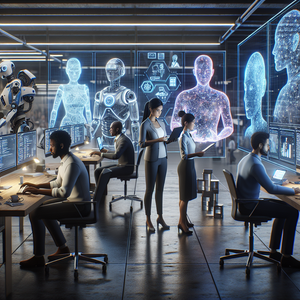Future-Proof Jobs in the Age of Automation

The integration of automation and AI has undeniably reshaped various industries. While tasks that are repetitive and routine are increasingly being performed by machines, there is a silver lining: new roles are emerging that necessitate human skills. The World Economic Forum estimates that while 85 million jobs could be displaced due to the shifts in labor dynamics, an astounding 97 million new roles may emerge that are better suited to the evolving division of labor. This presents an opportunity for workers to adapt and thrive in the face of change.
Creative Professions: The Demand for Human Imagination
Creativity remains a distinctly human trait that machines struggle to replicate. As industries like advertising, design, and entertainment evolve, the need for creative professionals is surging. Roles such as graphic designers, content creators, and marketing strategists are becoming critical for companies aiming to engage consumers effectively. For instance, the explosion of social media has led to a significant demand for social media managers who can create compelling narratives and connect authentically with audiences. Major brands like Nike and Coca-Cola consistently rely on creative talent to craft unique campaigns, underscoring the irreplaceable value of human creativity in the marketplace.
Emotional Intelligence: The Key to Strong Relationships
In an age where automation dominates technical tasks, jobs that require emotional intelligence are gaining prominence. Professions in healthcare, education, and customer service demand a high level of interpersonal skills. Roles such as psychologists, teachers, and social workers require empathy and understanding—capabilities that machines lack. A LinkedIn study highlights that emotional intelligence is one of the most sought-after skills by employers, with many prioritizing candidates who can manage relationships and communicate effectively with empathy. In a world where technology performs tasks but cannot connect with people, professionals equipped with high emotional intelligence will be indispensable.
Complex Problem Solving: The Need for Critical Thinkers
As industries face increasingly intricate challenges, the demand for critical thinkers and complex problem solvers is escalating. Fields such as engineering, data analysis, and management consulting require individuals who can analyze information, think critically, and devise innovative solutions. Data scientists, for instance, interpret vast amounts of data to help businesses make informed decisions. The demand for data scientists is projected to grow by 28% in the coming years, according to IBM, emphasizing the necessity of problem-solving skills in the modern workforce.
Tech-Savvy Roles: Bridging the Gap Between Humans and Machines
While some fear that technology will replace jobs, it is also creating new opportunities that blend technical and human skills. Positions such as AI specialists, machine learning engineers, and robotics technicians are on the rise, as companies seek to integrate technology into their operations. For example, AI trainers are responsible for teaching machines how to understand and process human language. This role requires both technical knowledge and an understanding of human communication, illustrating how future jobs will necessitate a combination of skill sets.
The job market is undeniably evolving, but rather than succumbing to fear, American workers can embrace the opportunities that lie ahead. Future-proof jobs that emphasize creativity, emotional intelligence, complex problem-solving, and technological proficiency are not only resilient against automation but also essential for driving innovation and growth across industries. By cultivating these uniquely human skills, individuals can secure their place in a future that values the irreplaceable qualities of human talent, ensuring job security and personal fulfillment in their professional lives. As we look ahead, it is crucial for workers to invest in their skills and adaptability, positioning themselves in roles that will thrive amid the rise of machines. The future is not solely about survival but about thriving in a world where human capabilities complement technological advancements, creating a more dynamic and innovative workforce.
Social Media Manager
Nike, Coca-Cola
Core Responsibilities
Develop and implement social media strategies to enhance brand presence and engagement across platforms.
Create, curate, and manage published content (images, video, and written) tailored to audience preferences.
Analyze social media metrics and generate reports to track performance and optimize campaigns.
Required Skills
Proficiency in social media platforms (e.g., Instagram, Facebook, Twitter) and analytics tools (e.g., Google Analytics, Hootsuite).
Strong writing and communication skills with a knack for storytelling and engagement.
Creativity and an understanding of current trends in digital marketing.
Data Scientist
Technology firms, financial institutions, healthcare organizations
Core Responsibilities
Analyze complex datasets to extract meaningful insights and inform strategic decisions.
Develop predictive models and machine learning algorithms to enhance business operations.
Collaborate with cross-functional teams to identify data needs and deliver actionable solutions.
Required Skills
Proficiency in programming languages such as Python or R, and familiarity with data visualization tools (e.g., Tableau, Power BI).
Strong statistical analysis skills and experience with big data technologies (e.g., Hadoop, Spark).
Problem-solving aptitude with the ability to communicate technical concepts to non-technical stakeholders.
AI Trainer
Google, Amazon
Core Responsibilities
Train AI systems to improve their performance in understanding and processing human languages.
Develop datasets and oversee the annotation process to ensure quality inputs for machine learning models.
Collaborate with engineers to refine algorithms based on user feedback and performance metrics.
Required Skills
Understanding of natural language processing (NLP) and machine learning principles.
Strong analytical skills with experience in data preparation and model evaluation.
Excellent communication skills to convey complex concepts to diverse teams.
User Experience (UX) Designer
Tech firms, e-commerce companies
Core Responsibilities
Conduct user research and usability testing to gather insights about user needs and preferences.
Create wireframes, prototypes, and user interfaces that enhance user interaction and satisfaction with products.
Collaborate with product teams to ensure design solutions align with business goals and user expectations.
Required Skills
Proficiency in design tools (e.g., Sketch, Adobe XD, Figma) and a strong portfolio showcasing successful projects.
Knowledge of user-centered design principles and familiarity with coding languages (HTML, CSS) is a plus.
Strong empathy and communication skills to advocate for users during the design process.
Health and Wellness Coach
Wellness centers, corporate wellness programs, fitness organizations
Core Responsibilities
Design personalized wellness programs based on clients' health goals and lifestyle assessments.
Provide guidance on nutrition, exercise, and mental well-being to help clients achieve sustainable health changes.
Track client progress and adjust strategies as necessary to ensure continued motivation and success.
Required Skills
Certification in health coaching or a related field (e.g., NASM, ACE) and a strong understanding of nutrition and fitness.
Excellent interpersonal skills to build trust and rapport with clients.
Strong organizational skills and the ability to motivate clients through challenges.


